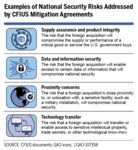

The Committee on Foreign Investment in the United States (CFIUS) has seen explosive caseload in recent years, though a performance audit finds the committee organization and management has struggled to keep up, according to a report released by the General Accounting Office (GAO).
Since 2000, the number of mitigation agreements has steadily increased, approximately quadrupling in the last decade, managed predominantly by the Departments of Defense and the Treasury. From December 2000 to December 2022, the total number of active mitigation agreements rose significantly from approximately five to nearly 230, reflecting an accumulation of ongoing agreements and the signing of new ones.
The report notes that the increasing number and complexity of foreign investment transactions reviewed by CFIUS raises concerns about its capability to effectively monitor and enforce compliance with these agreements.
The report also underscores challenges within CFIUS including an absence of documented processes for achieving consensus on enforcement actions or for deciding when to terminate outdated mitigation agreements.
Treasury plans to double its CFIUS monitoring staff by the end of fiscal year 2024 but has not documented objectives for this expansion, basing it on estimates rather than assessed needs.
Officials from the five selected agencies for the review pointed to an increase in both the number and complexity of mitigation agreements, questioning their capacity to sustain effective oversight.
Implementing a regular, committee-wide dialogue to coordinate on staffing needs is proposed to ensure CFIUS’s continued effectiveness in managing national security risks associated with foreign investments.
The report evaluates trends in mitigation agreements from 2000 through 2022, assesses approaches to monitoring, enforcing compliance, and reviewing the continued relevance of these agreements by selected CFIUS member agencies, and examines these agencies' staffing for monitoring and enforcement.
Officials from three of the five selected agencies expressed that their current resource levels are inadequate to meet or expand the scope of their monitoring and enforcement efforts. Although site visits are deemed essential for monitoring some agreements, officials from two agencies reported insufficient resources to meet site visit targets.
Despite shared responsibilities, CFIUS does not regularly discuss or coordinate on necessary staffing levels to monitor and enforce compliance with mitigation agreements. The Treasury, as CFIUS's chair, has not established a regular, committee-wide process for discussing and coordinating staffing needs among members.
Furthermore, CFIUS lacks a documented committee-wide process for deciding on enforcement actions, leading to challenges in addressing violations. Officials noted that each enforcement action is context-specific, which complicates the establishment of general criteria for enforcement.
On April 11, the Treasury department published a Notice of Proposed Rulemaking (NPRM) to "enhance certain CFIUS procedures and sharpen its penalty and enforcement authorities."
The proposed rule reflects CFIUS’s first substantive update to the mitigation and enforcement provisions of the CFIUS regulations since the enactment and implementation of the Foreign Investment Risk Review Modernization Act of 2018, which amended CFIUS’s governing statute (section 721 of the Defense Production Act of 1950).
The proposed rule "hones" CFIUS’s ability to accomplish its national security mission consistent with the United States’ open investment policy, according to a Treasury Department statement.
CFIUS is authorized to review certain transactions involving foreign investment into businesses in the United States and certain transactions by foreign persons involving real estate in the United States in order to determine the effect of such transactions on the national security of the United States.
CFIUS enforces transaction parties’ compliance with its statute and regulations, as well as agreements entered into and conditions and orders imposed under such authorities, through its authority to impose civil monetary penalties and seek other remedies.
The proposed rule would refine and enhance CFIUS’s authorities through the following key changes:
CFIUS Backgrounder
The Committee on Foreign Investment in the United States (CFIUS) is an interagency committee authorized by law to review national security risks associated with certain foreign investments in the United States. CFIUS evaluates notifications of foreign investments submitted predominantly on a voluntary basis, assessing whether these transactions pose national security threats.
Transactions under CFIUS's purview, generally referred to as "covered" transactions, include specific mergers, acquisitions, or takeovers by or with foreign entities that could result in foreign control of a U.S. business; certain noncontrolling, typically nonpassive, investments by foreign entities in specific U.S. businesses; and certain real estate transactions within the United States by foreign entities.
CFIUS's activities concerning specific transactions typically encompass:
Comments
No comments on this item Please log in to comment by clicking here